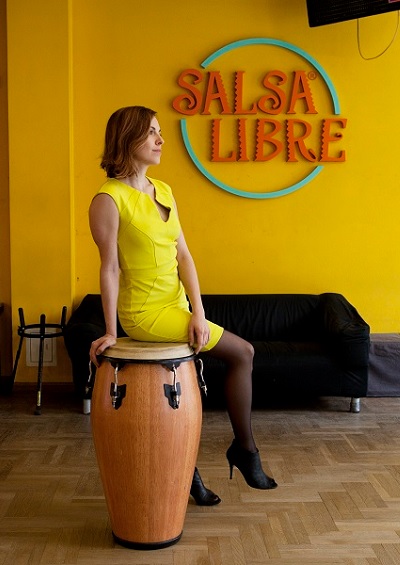Female Entrepreneurship Thrives in Poland
Poland leads the charge on female entrepreneurship, with more than one-third of its companies run by women.
September 13, 2015

Isabella De Maddalena was born in 1978 in Santa Margherita Ligure, Italy. After graduating from the Brera academy of Fine art, she worked in various photography studios in Milan and London from 2001 to 2006. In 2007, she became an assistant to photographer Stefano De Luigi.
In 2010 she completed a master’s degree in visual storytelling at the Danish school of Photojournalism in Aarhus. Her work focuses on social issues, often related to the status of women in contemporary society. Her pictures have been published in various magazines including Women’s Wear Daily, Io Donna, L’Espresso, and Rolling Stone Italy.
With more than one million companies run by women — more than one-third of the country’s total — Poland is one of Europe’s leading centers of female entrepreneurship. Many of these businesses were set up during the years of Poland’s economic transformation after the collapse of socialism in the Soviet Union and Eastern Europe.
The closure of many large state-owned businesses left many people with no other option than becoming self-employed — a trend which has been maintained since.
Text and photographs by Isabella De Maddalena
Julia Wollner is editor-in-chief of La Rivista, Poland’s first magazine about the culture, lifestyle and language of Italy. “To be successful, you need to give all you have and put it all on the table. It’s not enough to just do your job quietly; you need to give and share your personality, your sense of humor, everything that you are.”
Ania Chagowska owns Salsa Libre, a dance school in Warsaw. “Apparently the strong character of Polish women is a consequence of the [second world] war. I’ve been reading a lot about it. For many years women couldn’t count on men’s support in the family. Many men died during the war, or were in the army, or were taken into socialist prisons. Women had to stand on their own, they had to work and care for their homes and children. This is why we have a tradition of strong feminism.”
Maria Nowinska is the designer of the Nowinska Bag, one of Poland’s most successful leather bag brands. “It was very difficult at the beginning. Warsaw never had an artisan tradition so we had no know-how, no experience to build something, and it was hard to find workers. I lost three years of my life creating my company, I had no private life. But I’m a self-made woman and I learned everything by myself, so now I know that there are no impossible things.”
Marta Zieba-Szklarska runs Alter Group, a consultancy with offices in Warsaw and Krakow, and is active in a range of projects supporting entrepreneurship in Poland. “Women in business are able to build relationships based on trust, loyalty and quality. For men business is like a war, they are better competitors than us. But I think that women have the advantage and ability to communicate with each other, to cooperate.”
 Isabella De Maddalena was born in 1978 in Santa Margherita Ligure, Italy. After graduating from the Brera academy of Fine art, she worked in various photography studios in Milan and London from 2001 to 2006. In 2007, she became an assistant to photographer Stefano De Luigi. And in 2010 she completed a master’s degree in visual storytelling at the Danish school of Photojournalism in Aarhus. Her work focuses on social issues, often related to the status of women in contemporary society. Her pictures have been published in various magazines including Women’s Wear Daily, Io Donna, L’Espresso, and Rolling Stone Italy.
Isabella De Maddalena was born in 1978 in Santa Margherita Ligure, Italy. After graduating from the Brera academy of Fine art, she worked in various photography studios in Milan and London from 2001 to 2006. In 2007, she became an assistant to photographer Stefano De Luigi. And in 2010 she completed a master’s degree in visual storytelling at the Danish school of Photojournalism in Aarhus. Her work focuses on social issues, often related to the status of women in contemporary society. Her pictures have been published in various magazines including Women’s Wear Daily, Io Donna, L’Espresso, and Rolling Stone Italy.The Other Hundred is a unique photo-book project aimed telling the stories of people around the world who are not rich but who deserve to be celebrated.
The Other Hundred Entrepreneurs: 100 Faces, Places, Stories — the second volume in The Other Hundred series — focuses on the world’s everyday entrepreneurs. It captures the reality that small and medium-sized businesses, rather than tech billionaires or elite MBAs, contribute the majority of the world’s jobs, including half of all jobs in Africa and two-thirds in Asia.
The book offers an alternative to the view that most successful entrepreneurs were trained at elite business schools. Here are people who have never written a formal business plan, hired an investment bank, planned an exit strategy or dreamt of a stock market floatation. Some work for themselves, others employ a few people, still others a few hundred.
 The book’s 100 stories were chosen from a pool of 10,000 images shot in nearly 150 countries. The book is published by Oneworld Publications in London and is available in bookstores worldwide and online.
The book’s 100 stories were chosen from a pool of 10,000 images shot in nearly 150 countries. The book is published by Oneworld Publications in London and is available in bookstores worldwide and online.Takeaways
Poland leads the charge on female entrepreneurship, with more than one-third of its companies run by women.
Six photos show us the incredible stories of six female entrepreneurs in Poland.
After WWII women had to stand on their own in Poland, creating a strong tradition of feminism.





